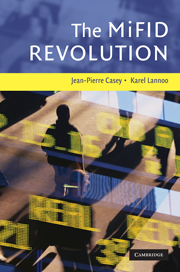Book contents
- Frontmatter
- Contents
- List of illustrations
- Preface
- Introduction
- 1 The MiFID revolution
- 2 Origins and structure of MiFID
- 3 Client suitability and appropriateness under MIFID
- 4 Best execution
- 5 Financial market data and MiFID
- 6 Managing conflicts of interest: from ISD to MiFID
- 7 The MiFID approach to inducements – imperfect tools for a worthy policy objective
- 8 MiFID's impact on the fund management industry
- 9 MiFID and bond market transparency
- 10 The division of home and host country competences under MiFID
- 11 MiFID and Reg NMS: a test-case for ‘substituted compliance’?
- Glossary
- ANNEX I List of services and activities and financial instruments falling under the MiFID's scope
- Bibliography
- Index
4 - Best execution
Published online by Cambridge University Press: 04 August 2010
- Frontmatter
- Contents
- List of illustrations
- Preface
- Introduction
- 1 The MiFID revolution
- 2 Origins and structure of MiFID
- 3 Client suitability and appropriateness under MIFID
- 4 Best execution
- 5 Financial market data and MiFID
- 6 Managing conflicts of interest: from ISD to MiFID
- 7 The MiFID approach to inducements – imperfect tools for a worthy policy objective
- 8 MiFID's impact on the fund management industry
- 9 MiFID and bond market transparency
- 10 The division of home and host country competences under MiFID
- 11 MiFID and Reg NMS: a test-case for ‘substituted compliance’?
- Glossary
- ANNEX I List of services and activities and financial instruments falling under the MiFID's scope
- Bibliography
- Index
Summary
The requirement to seek the most favourable execution reasonably available for securities transactions is one of the core concepts of the new conduct of business regime of the MiFID Directive. Under MiFID, the EU has put in place a framework under which best execution is regulated in a harmonized framework. In conjunction with the abolition of the monopoly of exchanges, it provides the basic structure for competition among trading platforms and execution venues. Investment firms are requested to execute a trade on the basis of the best possible result for their clients. Its practical implementation holds many conceptual and practical challenges, however.
In this chapter, we argue that best execution originated from the common contract law's concept of fiduciary duty in light of the agency relation between brokers and their clients. Provided that brokers hold superior information and have conflicting interests with respect to their clients, regulators mandated best execution to ensure investor protection. However, because of high monitoring and measuring costs, best execution must stress process and market competition over a strict quantitative enforcement. Thus best execution mutates from a pure investor protection objective to both an investor protection and a market efficiency objective. In effect, MiFID follows exactly this approach: by allowing flexible best execution policies and encouraging trading venues' competition, MiFID aims at achieving investor protection and market efficiency without cumbersome and unenforceable regulation.
A broad fiduciary duty concept already existed in EU law, but its definition was vague and its enforcement was left to the host country.
- Type
- Chapter
- Information
- The MiFID Revolution , pp. 58 - 77Publisher: Cambridge University PressPrint publication year: 2009



